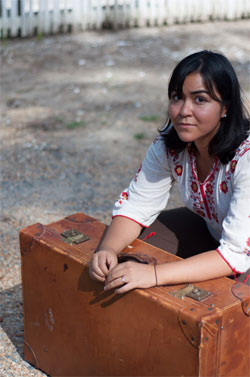by Kirklyn Escondo, Director of Community Building New York, NY - On the afternoon of Wednesday, May 22, 2013, 18 Million Rising organized a "Twitter town hall" to engage the Asian American Pacific Islander community in a virtual dialogue regarding the highly contended immigration reform bill. Approved by the Senate Judiciary Committee just last week, the bill will require 60 out of 100 votes to pass the Senate, at which point it will surely be debated to shreds at the Republican-controlled House of Representatives.
"We're excited to bring together organizers, policy experts, media figures, and the community, who are all part of #18MillionHearts," began 18 Million Rising (@18millionrising). Within minutes, the town hall prompted dozens of Tweets per minute, the hashtag "#18MillionHearts" Trending in San Francisco and Los Angeles and then nationally halfway through the discussion. The complex bill, which left the hands of the SJC with amendments that ranged from reunifying Filipino WWII veterans and their children to making DREAMers eligible for Federal Student Aid, was simultaneously praised and bashed by Twitter users across the nation. The dialogue featured comments by guest "panelists" that included Ai-Jen Poo of the National Domestic Worker’s Alliance, Gregory Cendana of the Asian Pacific American Labor Alliance, Margaret Huang of the Rights Working Group, Pramila Jayapal of the Center for Community Change, Saket Soni of the National Guestworker Alliance and Richard Lui, MSNBC correspondent, who answered a series of questions laid out by the folks of 18 Million Rising.
Senator Mazie Hirono (@maziehirono) of Hawaii, member of the SJC, even dropped in and reiterated her support for the AAPI community - prompting a flurry of comments such as, "We are very proud of & thankful for the amazing leadership of our champion, Sen. @maziehirono during #SJC proceedings!" by Mee Moua (@mee_moua) of the Asian American Justice Center, and "Imagine if there were more people like @maziehirono on #SJC & in Congress. Bill would look a lot different," from Gregory Cendana (@gregorycendana).
Arguably well-deserved praise, since Senator Hirono was responsible for the amendment calling for the reunification of Filipino WWII veterans and their families, along with other amendments that brought attention to specific needs of certain minority groups.
The town hall revealed the community's poignant concerns with the proposed bill, straight from the horse's mouth, so to speak - participants in the dialogue collectively bemoaned the bill's departure from a family-based immigration system to merit-based visa acquisition. "Merit-based #CIR de-prioritizes women and domestic workers who make all other work possible," commented a representative from the Asian American Legal Defense Fund (@AALDEF). Labor organizer Ai-Jen Poo (@aijenpoo) agreed. "Women often work in jobs w/o proof of employment. Need to make sure they're eligible for path to citizenship," she Tweeted. "Many mothers have been deported in recent years & must be able to reunite w/their children & families."
"Good god please consider too how merit-based reform reinforces the model minority myth," added Twitter user Suey Park (@suey_park).
Another concern raised was the bill's exclusion of same sex or LGBTQ binational couples in family immigration. In fact, the LGBTQ community seemed to have been overlooked by the immigration bill entirely. "From #18MillionHearts feed, it seems like a LOT of folks are very concerned abt #LGBT inclusion in #cir13," a representative from 18 Million Rising Tweeted.
Other issues discussed included possible risks posed by increased border security and enforcement. "GOP says need more border security but US already spends $18 billion/year on immigration & border enforcement," commented Margaret Huang (@RWG_Margaret).
Comments on healthcare and due process seemed to have been few and far between.
At the tail end of the town hall, 18 Million Rising asked, "What can we do TOGETHER to pass fair & just immigration reform?" Recommendations included uniting all minority communities under one banner. "Alliance build with Latino, African, African American & LGBTQ communities - this is an American issue!" suggested Twitter user Bicoastal Bitchin (@BicoastalBitchn). "And to include Irish, Latino, and AAPI voices in forums, panels to exhibit a chorus," Richard Lui (@RichardLui) added. He also advised the AAPI community to exercise their electoral rights and promote civic engagement, citing the record turnout of Asian American voters for the 2012 presidential election.
I would encourage many more of these Twitter town halls, where community members can express their thoughts and connect with and learn from the grassroots advocates who are essentially experts in their fields (e.g., now I know Ai-Jen Poo's Twitter handle, yay). It does away with the need for a physical venue and the inevitable scheduling conflicts that affect turnout (you don't have to leave your house! Or put on pants!). In this way, we can initiate a live dialogue that has the potential to become truly global. It lets viewers participate in a discussion across time zones, and allows for a certain anonymity that may just appeal to those who may fear putting a face (or even a real name) to their hard-hitting questions regarding immigration. It utilizes social media to engage the masses by bringing popular attention to important issues in "invisible" communities. Let's exhibit a chorus, and make sure our voices are heard and our concerns "Trending" nationally, globally, and within our communities themselves. And isn't that how the young'uns get their news nowadays, via Twitter Trends?
Sigh. If only we can avoid all the trolling, like this lovely piece of wisdom: "#18millionhearts for One Direction !!!! For 5 Seconds of Summer !!!! For Little Mix !!!! Ed Sheeran !!!!"
#Stopit.





